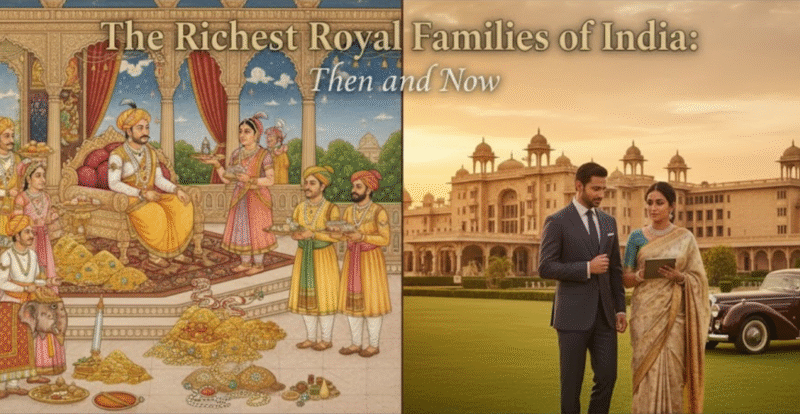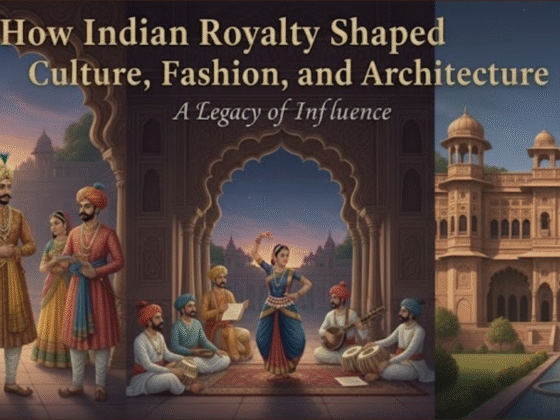Introduction to Indian Royalty
India has long been a land of kings, emperors, and dynasties. The stories of its royal families are woven into the very fabric of its rich history, showcasing both opulence and power. From the grandeur of palaces to the lavish lifestyles filled with art, culture, and extraordinary wealth, Indian royalty evokes fascination even today.
But what does it mean to be part of a royal family in contemporary India? As we delve into the tales of India’s richest royal families then and now, we’ll explore their remarkable rise to prominence, periods of decline, and how they have adapted in modern times. These narratives reveal not just wealth but also influence that has shaped society across centuries. Join us on this captivating journey through time as we uncover the legacies left behind by these iconic families!
The Wealth and Power of the Mughal Dynasty
The Mughal Dynasty, which flourished from the early 16th to the 19th century, epitomized wealth and opulence. Established by Babur, it expanded under rulers like Akbar and Shah Jahan. Their reign was marked by stunning architecture and rich cultural advancements.
One of their most famous legacies is the Taj Mahal, an enduring symbol of love built with resources that showcased unparalleled craftsmanship. The Mughals had access to vast treasures, sourced from extensive trade networks spanning Asia and Europe.
Their power wasn’t just economic; it was political too. They effectively controlled large territories through a centralized system that integrated diverse cultures. The royal court became a melting pot of ideas, art forms, and traditions.
Luxury permeated every aspect of life in this dynasty—from lavish banquets featuring exotic delicacies to intricate textiles adorned with precious gems. This grandeur defined not only their era but also left an indelible mark on Indian society at large.
Rise and Decline of the Maratha Empire
The Maratha Empire emerged in the 17th century, founded by Chhatrapati Shivaji Maharaj. His innovative military tactics and strong leadership forged a formidable force against Mughal dominance.
At its zenith, the empire sprawled across much of India, boasting significant wealth from trade and agriculture. The Marathas were not just warriors; they established a robust administrative system that promoted local governance.
However, internal strife began to take a toll as rival factions emerged. The death of key leaders led to fragmentation within the empire.
The arrival of British colonial powers further complicated matters. Battles like those at Panipat showcased both valor and vulnerability.
By the late 18th century, what once was an expansive domain dwindled under external pressures and internal discord, marking the decline of one of India’s most influential royal families.
Modern Day Royals: The Gaekwads of Baroda
The Gaekwads of Baroda represent a fascinating chapter in India’s royal history. Once rulers of the princely state of Baroda, they are known for their rich heritage and contributions to culture and society.
Today, the legacy of Sayajirao Gaekwad III stands out. He was instrumental in modernizing Baroda during the late 19th century. His efforts in education and infrastructure transformed the region into a thriving hub.
In contemporary times, descendants like Maharaja Samarjitsinh Gaekwad continue to uphold this legacy. They engage actively with charitable initiatives aimed at health and education.
Notably, the family has retained its wealth but also adapted to modern sensibilities. Their palatial residences serve both as historical landmarks and operating venues for cultural events.
The Gaekwads have successfully blended tradition with modernity while maintaining their royal identity amid changing times. Their story showcases resilience and adaptability in an evolving India.
The Nizams of Hyderabad: From Riches to Rags
The Nizams of Hyderabad were once the epitome of wealth and grandeur. With opulent palaces, lavish lifestyles, and treasures that dazzled the world, their reign was a testament to royal splendor.
During the 19th century, they ranked among the richest men globally. Their collection included priceless jewels, intricate artifacts, and vast lands. The Nizam’s signature diamond-encrusted crown is still famed for its magnificence.
However, this dynasty faced significant challenges post-Indian independence in 1947. Political changes led to diminished power and loss of status. Economic struggles forced them to sell off properties that once symbolized their authority.
Today, remnants of their glory remain visible in architectural marvels like the Chowmohalla Palace but serve as a stark reminder of what once was. The transition from immense wealth to relative obscurity tells a poignant story about changing times and fortunes.
Comparing the Net Worth of India’s Royal Families Then and Now
The net worth of India royal families has seen dramatic shifts over the centuries. In the heyday of the Mughal Empire, wealth was measured in vast territories and luxurious lifestyles. Emperors like Akbar and Shah Jahan displayed opulence through grand palaces and priceless jewels.
Fast forward to modern times, where many descendants face financial challenges. The lavish estates often turned into museums or hotels due to rising maintenance costs.
However, some royals have embraced business ventures, adapting their heritage for contemporary audiences. The Gaekwads of Baroda illustrate this transition well; they transformed family assets into successful enterprises.
In stark contrast, the Nizams of Hyderabad once held immense power but saw their fortunes dwindle post-independence. Today’s valuations reflect not only material wealth but also cultural influence within Indian society.
Comparing past riches with today’s realities unveils a tapestry woven from history, adaptation, and resilience amidst changing times.
Impact on Indian Society and Culture
The royal families of India have left an indelible mark on the nation’s cultural fabric. Their influence is evident in art, architecture, and even cuisine. Palaces adorned with intricate carvings stand as testaments to their patronage of artisans.
Festivals often showcase the grandeur associated with royalty. Vibrant processions and elaborate celebrations stem from traditions established by these dynasties. They continue to bring people together, preserving age-old customs while adapting them for modern audiences.
Education was also a significant focus for many royals. Establishing schools and institutions helped foster learning within their realms. This legacy continues today, shaping generations towards knowledge and progress.
Socially, these families have evolved into symbols of heritage. Many engage in philanthropy now, addressing contemporary issues like poverty and education gaps—bridging the past with present needs through active involvement in society’s upliftment efforts.



